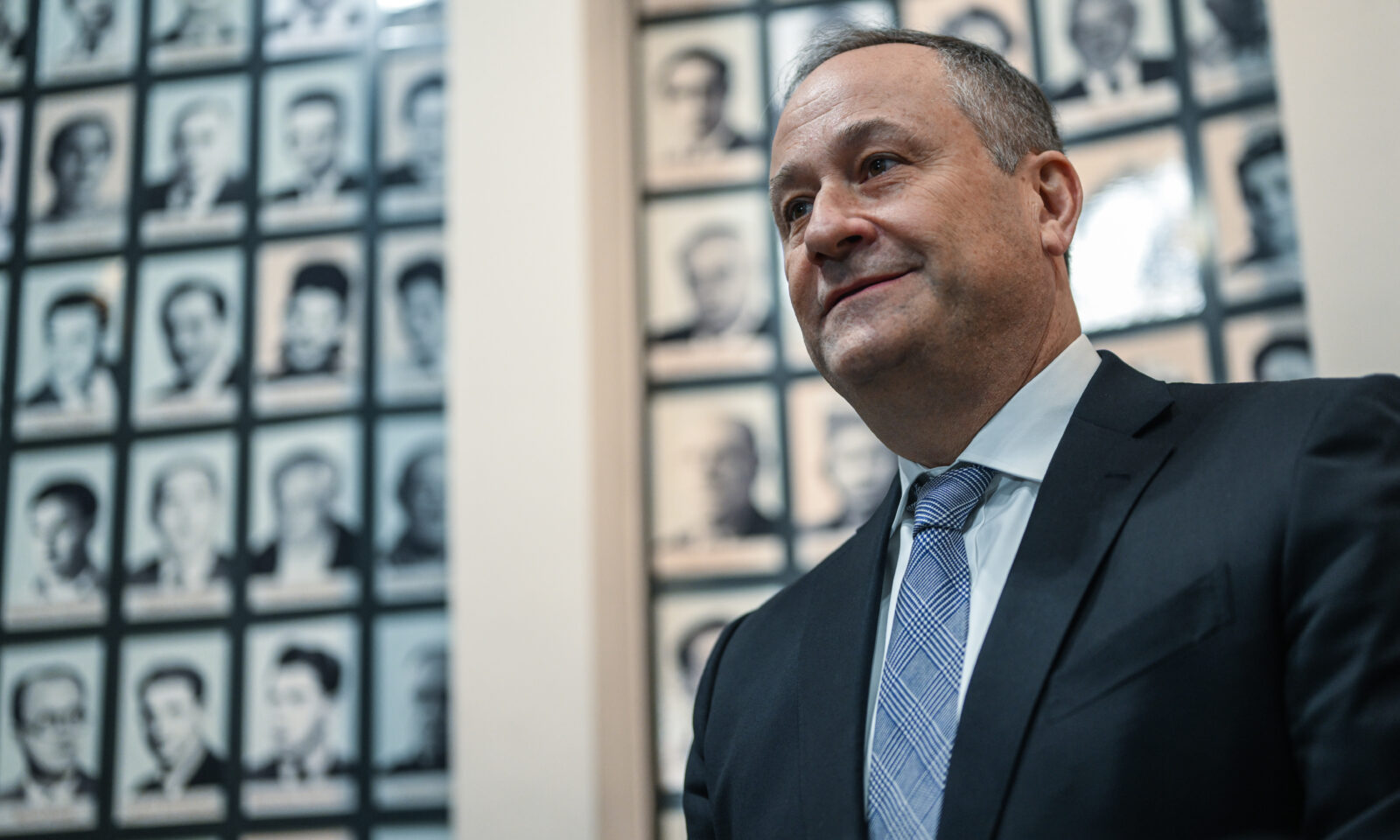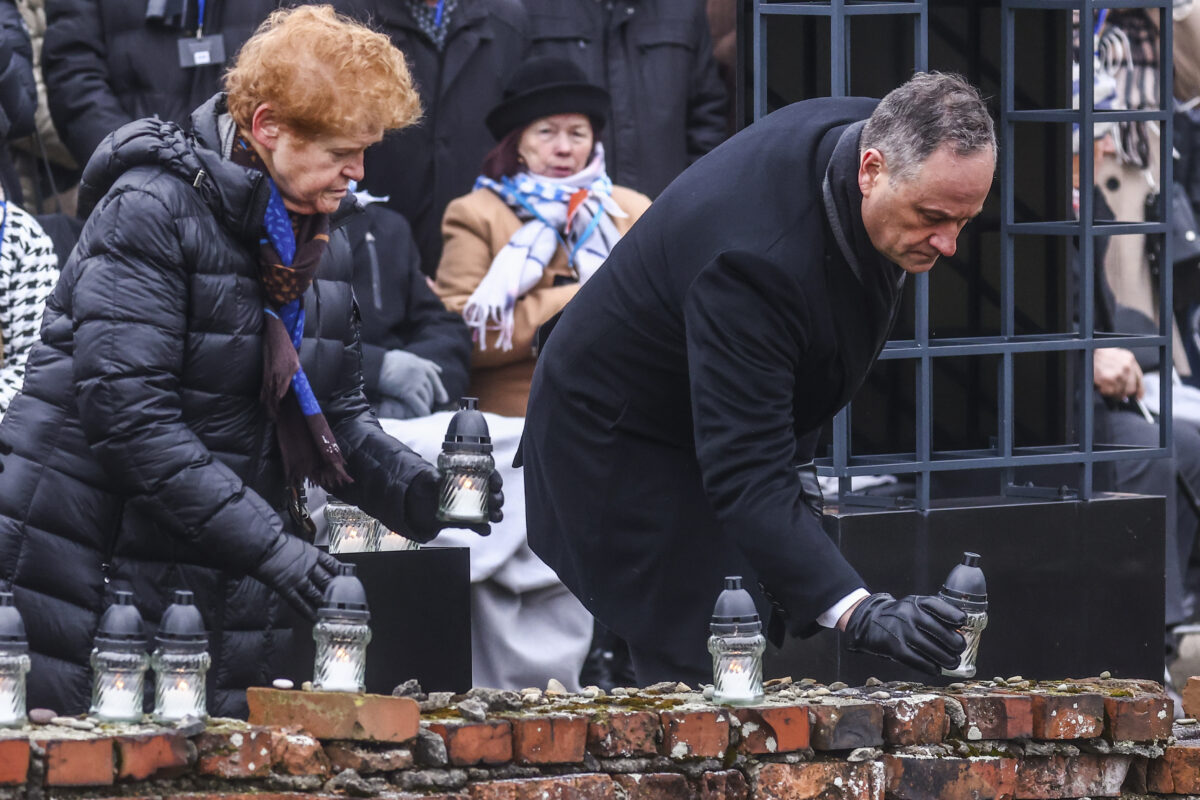
Omar Marques/Getty Images
Tracing his family history in Poland, Emhoff explains his approach to antisemitism
The second gentleman wants a big-tent message that unites the Jewish community. Can it actually lead to change?
KRAKOW, Poland — On a cold Sunday morning, Second Gentleman Doug Emhoff sat in this medieval city’s historic Jewish quarter at a trendy coffee shop called Cheder, the Hebrew word for a traditional Jewish primary school. Bookshelves crammed with Jewish volumes in Polish, English and Hebrew covered the walls from floor to ceiling.
But the room was not filled with Jewish boys studying together: That Emhoff is a Jew likely made him unique among the patrons of the café. Church bells rang across the city as he sipped coffee inside.
Poland was for centuries the beating heart of Jewish life in Europe, and half of the 6 million Jews killed in the Holocaust were Polish. After the war, what few Jews remained in Poland mostly fled, first to displaced persons camps in Europe and then to Israel, the Soviet Union or the U.S. In recent years, Krakow has experienced a moderate rebirth of Jewish life. Still, fewer than 10,000 Jews live in this country that once was home to one of the most vibrant and diverse Jewish communities in history.
So there was no better place for Emhoff, the first Jewish spouse of a president or vice president, to visit in order to viscerally understand what happens when antisemitism is taken to its most extreme, brutal manifestation. He was in the middle of a five-day swing through Poland and Germany to mark International Holocaust Remembrance Day, which fell on Friday.
“This happened. This is real. If you don’t believe me, go — go see what I saw,” Emhoff told Jewish Insider on Sunday, two days after an emotional visit to the Auschwitz-Birkenau concentration camp on the 78th anniversary of its liberation. Emhoff, who learned recently that his great-grandmother was from Poland, spoke powerfully throughout the trip about his family’s connection to the country and their luck in getting out decades before the war.
Over the past several months, Emhoff has emerged as a visible advocate for the Jewish community and a figurehead in the national fight against antisemitism. Attacks on Jews and Jewish institutions in the U.S., as well as online hate directed at members of the Jewish community, have recently increased to levels not seen in decades. While his position is largely ceremonial, Emhoff has something that policymakers in Congress and state capitals do not: a direct line to President Joe Biden and Vice President Kamala Harris, his wife.
But while in Poland, Emhoff was careful to only characterize his role as that of a listener, maybe even a catalyst or a cheerleader, but certainly not that of a policymaker.
Instead, he offered a window into his approach to the issue, articulating a big-tent vision for combating antisemitism that requires building a broad base of support across party lines while avoiding some of the more contentious questions around antisemitism, like the place of anti-Zionism or Islamist extremism.
“This whole thing is to listen and bring back good ideas that we can use as we’re building out our national plan,” he said. The White House announced in December the creation of an interagency task force focused on combating antisemitism and other forms of hate, with a mandate to create a national strategy on antisemitism. The news came days after Emhoff had hosted Jewish leaders at the White House with senior officials including Susan Rice, the director of the U.S. Domestic Policy Council, who is known to have Biden’s ear on policy matters.

Emhoff was joined in Europe by Deborah Lipstadt, the U.S. special envoy to monitor and combat antisemitism and a longtime Emory University professor. Lipstadt has spoken for years about the diverse forms that antisemitism takes: on the political right and the political left and, particularly in Europe over the past decade, from Islamist extremism. Emhoff, though, prefers to avoid getting into those details.
“We’re not that granular yet,” he said, when asked whether he intends to focus on more specific forms of antisemitism like jihadism or anti-Zionism. “There are certain aspects that we’ve discussed in terms of security, funding and how to address particular issues, but I’m really right now just focused on listening, gathering information, bringing it back, and then trying to figure out the best way to deal with it.”
Emhoff has been reluctant to speak about where Israel fits into the White House’s approach to antisemitism, even as many Jewish leaders have argued more forcefully in recent years that anti-Zionism often veers into antisemitism. Early in Biden’s term, Secretary of State Tony Blinken wrote to pro-Israel leaders articulating the administration’s support for the International Holocaust Remembrance Alliance (IHRA) working definition of antisemitism, which includes examples of when criticism of Israel crosses the line into antisemitism.
“I’m just focused on antisemitism,” Emhoff told JI.
He recently met with Hillel students at Arizona State University for a conversation about antisemitism and said his takeaway was “the students really want to feel a part of a broader coalition in dealing with hate and dealing with other issues,” Emhoff explained, “where they want to be there for other groups that might be facing issues, whereas they want those groups to help them.”
A 2021 study from the Anti-Defamation League and Hillel found that antisemitic incidents on college campuses increased significantly in the wake of the May 2021 conflict between Israel and Hamas, with many Jewish students feeling ostracized from broader campus social circles because of their views on Israel. Nearly a quarter (24%) of respondents said others had “assumed [they] hold particular views on Israel or Israeli policy because [they] are Jewish,” and 10% reported they “felt unwelcome in a campus organization because of actual or perceived support for Israel as a Jew.”
“We didn’t really get into it that much, if at all,” Emhoff said, when asked whether he and the students discussed how debates around Israel play into their feeling unwelcome in coalitions. “My message to them was the same to everyone. Like, I just really want to hit the issue of antisemitism and talk about that. And, just, that’s the thing that unites, in my opinion, Jews.”
Still, Israel was impossible to avoid, even while in Poland. Hours after Emhoff wrapped up his visit to Auschwitz-Birkenau, a Palestinian terrorist killed seven Israelis as they were leaving a Friday night prayer service in Jerusalem. The next morning, after a Saturday morning tour at the Oskar Schindler Enamel Factory in Krakow, Emhoff addressed the incident. He said he had spoken about it with his wife on the phone.
“This is a terrorist attack. This is murder. This is something that’s horrible. These were people who were just praying in a temple, living their everyday lives, and were murdered in cold blood,” he told reporters. “It’s something that we need to just stop. And that’s why we’re doing this work. And that’s why I’m gonna continue to do this work. But it’s also — we stand with the people of Israel on this. We’re committed to the security of Israel.”
On the next leg of his trip, Emhoff attended a convening on Monday of antisemitism envoys in Berlin, alongside Lipstadt. There, he heard from representatives from European nations, including Germany, Romania, Austria, Croatia and the United Kingdom, that have been dealing with surging antisemitism for many years.
Earlier in the trip, he also met in Krakow with Jewish and interfaith leaders about tolerance and antisemitism.
“It was a real good lesson,” he told JI of the Krakow roundtable, that “no matter where you land politically, on a religious spectrum, it’s committed towards [fighting] the scourge of antisemitism.” He pointed to specific ideas that they discussed, like engaging young people, dealing with legal issues, involving the private sector and NGOs, and mobilizing educators and historians.
It’s no small feat that in his two years as second gentleman, Emhoff has managed to, by and large, win over the American Jewish community, especially given that he did not come into this job expecting to be famous for being Jewish. “I never would have thought that this would be my path as second gentleman, working on the safety and security for Jewish Americans and Jews around the world, that that would really become my cause and my mission,” he said at the Monday event.
He expected to emphasize his unique status as the first male spouse of a president or vice president. Instead, he’s won over legions of Jewish admirers with his stories about Jewish summer camp and his grandmother’s brisket. He often visits Jewish communities when traveling in the U.S., such as when he stopped at a kosher deli in Des Moines, Iowa, in November.

But his trip to Poland, which was mostly a cultural visit, also took on the trappings of an emotion-laden roots journey, something uniquely personal for the spouse of a president or vice president. His last stop before departing to Berlin was Gorlice, the town where his great-grandmother was believed to have lived before she fled to the U.S. roughly 120 years ago.
After a two-hour drive through winding roads in the Polish countryside, blanketed by snow, Emhoff’s motorcade pulled up to the town hall. A mural was painted on the wall, dated 2005, marking Gorlice’s 650th anniversary. Before World War II, the town’s population was more than half Jewish. Now, none remain. (Many were killed in an August 1942 massacre memorialized in a forest outside town, where a mass grave marks the site of the tragedy.)
“Welcome home,” Gorlice Mayor Rafal Kukla said to Emhoff when he stepped out of his car. Later, after a tour of Gorlice, Emhoff placed a stone — a Jewish mourning custom, in lieu of leaving flowers — at a small Holocaust memorial in the town square.
“Everyone wants to know where they come from. I think that’s important to know, and to see this beautiful place, to see how it was, but to see the violence that happened here, and all over Europe to disrupt what were ordinary lives,” Emhoff told reporters. “These were ordinary people just living their lives but because of propaganda, misinformation, disinformation, antisemitism and hate, it led to mass murder. And that’s why we have to do this work. And that’s why I’m doing everything I can on behalf of our administration, with our partners and friends in Europe, to make sure that we push back so this does not happen again.”
Emhoff had not yet told his parents he was coming to Gorlice, but said there would “probably [be] a lot of tears” when he next spoke to them. Then he paused, choked up. He smiled. “I’m looking forward to that.”


